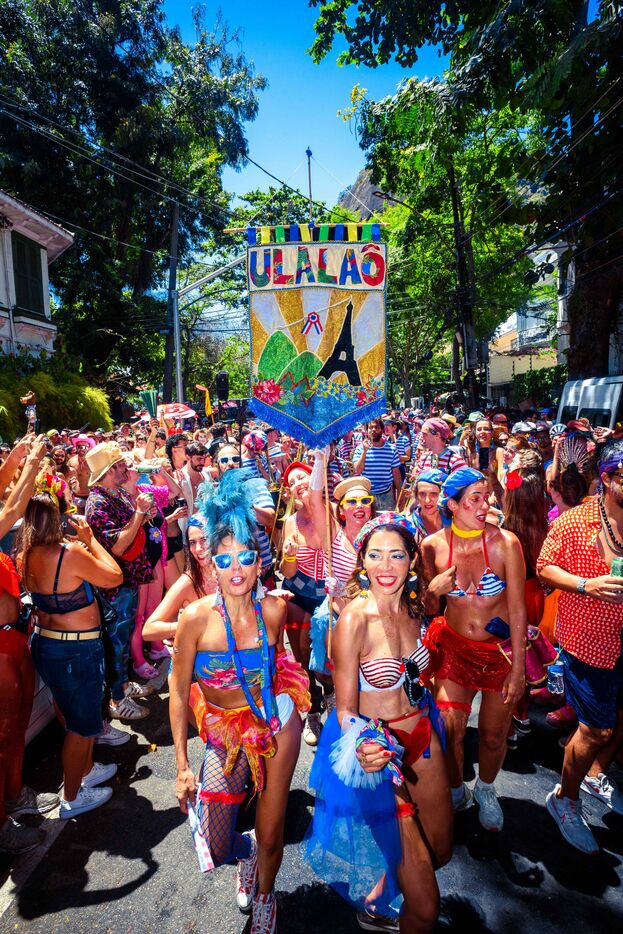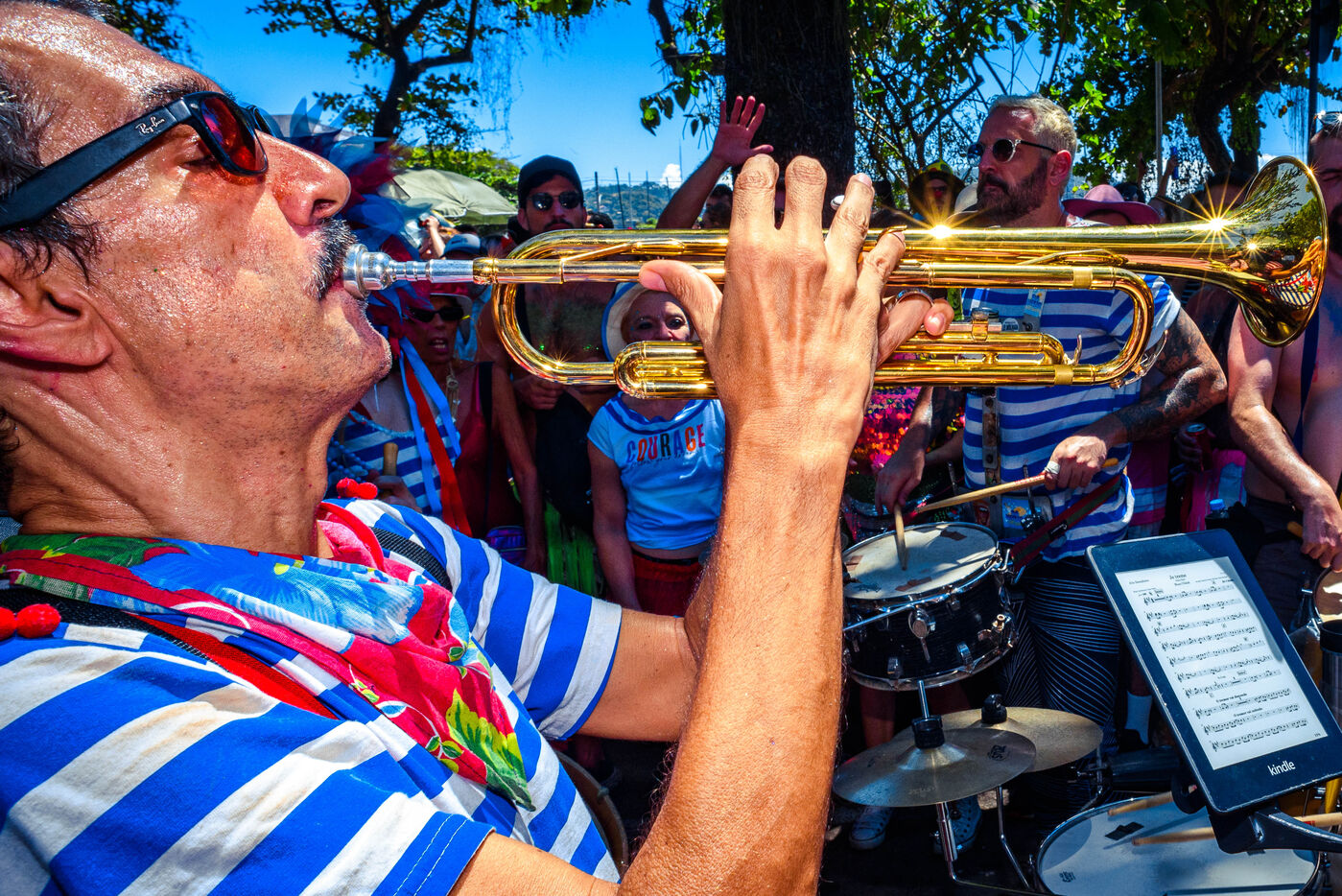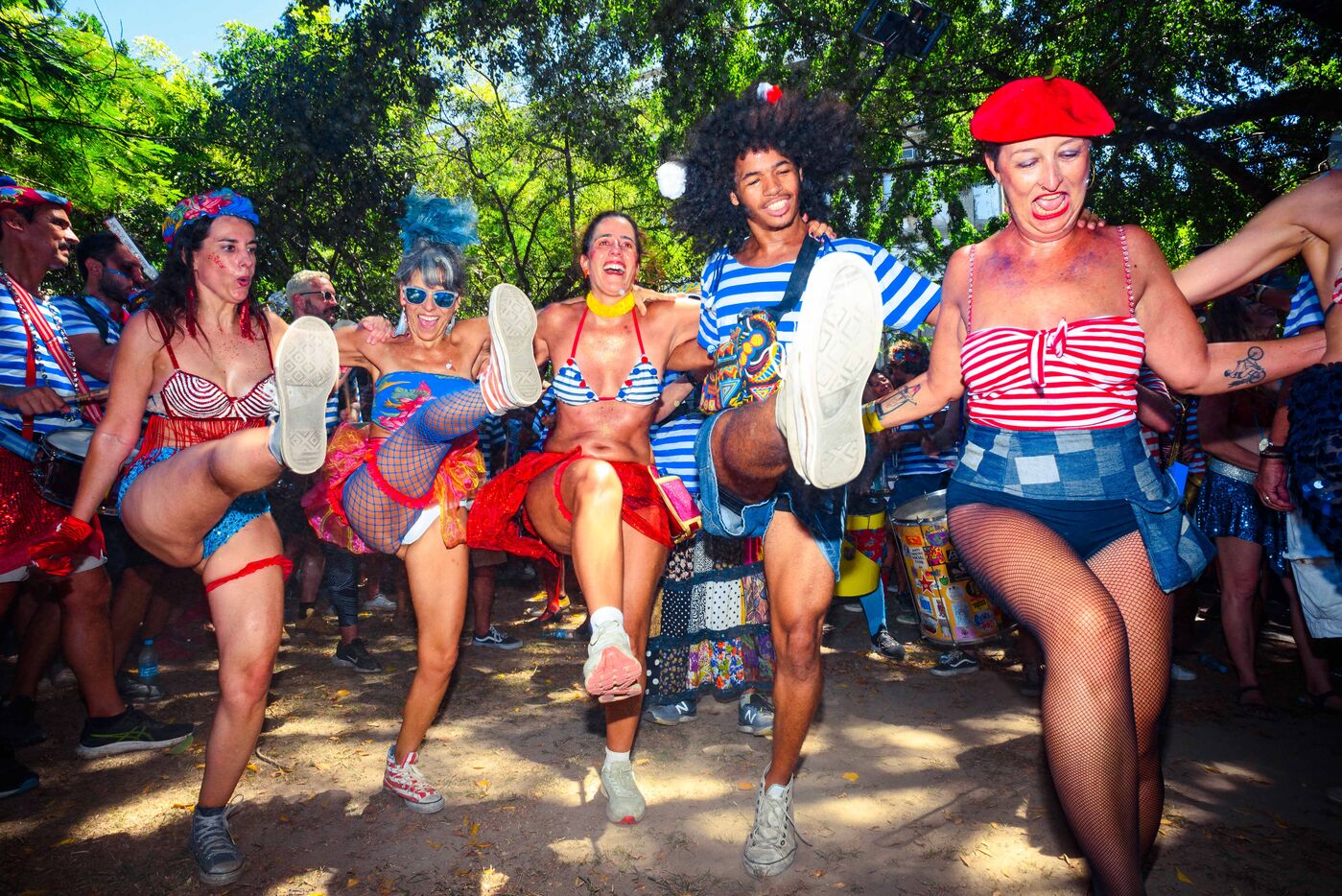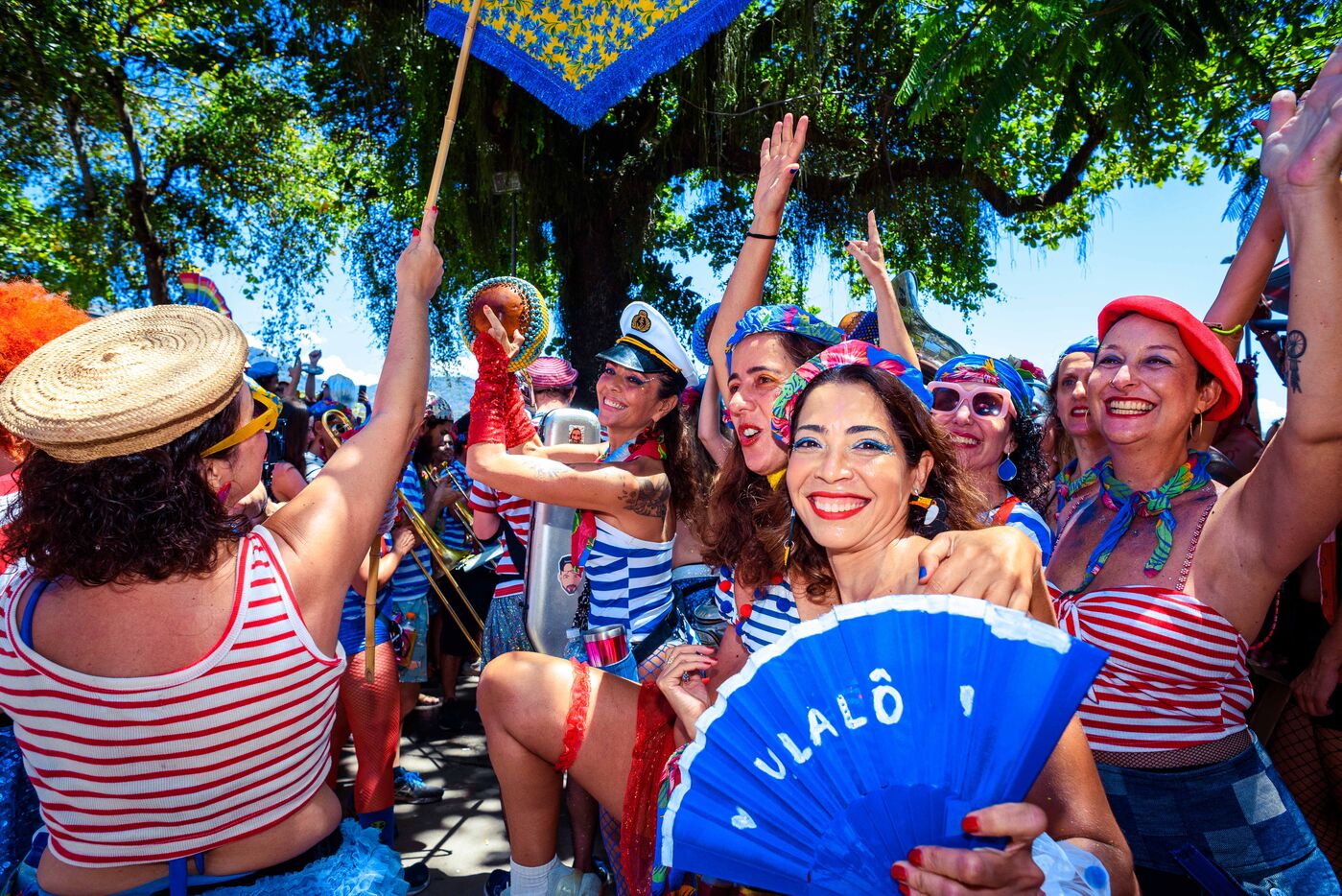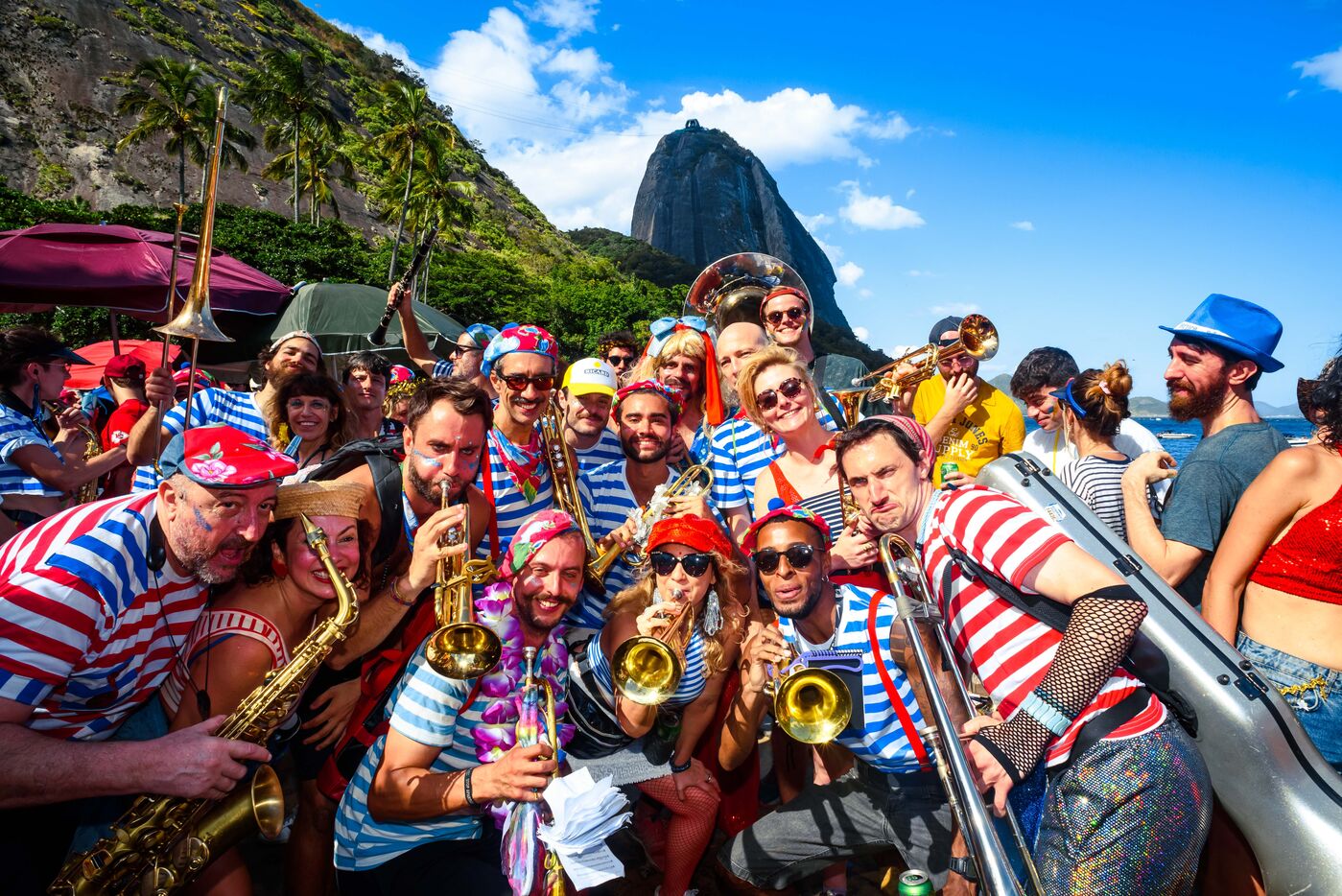Pour accéder à la série en entier, vous devez vous logger ou demander un compte Hans Lucas en cliquant ici.
Ulalaô: Can Can Carnaval
En 2025, la France et le Brésil célèbrent 200 ans d’amitié – un bicentenaire marqué par un dialogue culturel qui a profondément influencé les deux nations. De l’art à l’architecture, en passant par la musique et l’identité, ces deux pays partagent une histoire intimement tissée dans le tissu même de leurs sociétés. Au cœur de cette célébration historique, Ulalaô se dresse comme un hommage vivant à ce lien durable.
Bien plus qu’un simple bloco de carnaval, Ulalaô est un pont culturel où les mélodies françaises rencontrent les rythmes brésiliens, et où les échos du passé résonnent dans chaque note. Son nom incarne déjà cette fusion, mêlant l’exclamation française « Ouh là là » à « Alalaô », un hymne emblématique du carnaval brésilien. La musique suit cette même dynamique, transformant la valse musette en batucada, réimaginant Voyage Voyage en funk carioca, et révélant l’étonnante proximité mélodique entre Georges Brassens et Dorival Caymmi. Ce projet n’est pas qu’une simple expérimentation musicale ; il est le fruit de vingt années de recherches sur le dialogue artistique qui unit la France et le Brésil depuis des siècles – de Heitor Villa-Lobos composant dans le Paris des années 1920 aux échos de Serge Gainsbourg dans les rythmes de Rio.
Fondé en août 2023 et pleinement opérationnel dès février 2024, Ulalaô incarne l’esprit de l’échange culturel. Ses membres – à moitié Français et Européens, à moitié Brésiliens – jouent côte à côte, accueillant régulièrement des musiciens de passage des deux pays. Son premier défilé, dans le quartier de l’Urca avec pour toile de fond le Pain de Sucre, a rassemblé plus de 2 000 fêtards. En 2024, Ulalaô a partagé la scène avec Fülü, une fanfare venue de Toulouse. En 2025, le bloco accueille des musiciens français, brésiliens et européens pour un grand défilé de carnaval le 3 mars sur la place du Quadrado da Urca.
Ce projet dépasse la simple musique : il s’inscrit dans une continuité historique. L’Année France-Brésil du croisement culturel en 2025 rend hommage à deux siècles de collaboration artistique et intellectuelle, un héritage qui remonte à 1816, lorsque la Mission artistique française est arrivée à Rio à bord d’un navire français. Cet événement a contribué à façonner les institutions artistiques et académiques brésiliennes, jetant les bases d’une relation qui s’est épanouie au fil des générations.
Aujourd’hui, Ulalaô incarne cet héritage – non comme un vestige du passé, mais comme une célébration vibrante et en constante évolution de deux cultures en harmonie. C’est un carnaval du partage, où la Tour Eiffel et le Pain de Sucre dansent au même rythme, où l’histoire et la musique s’entrelacent, et où 200 ans d’amitié prennent vie, note par note.
Ulalaô: Can Can Carnaval
In 2025, France and Brazil commemorate 200 years of friendship—a bicentennial celebration of cultural dialogue that has shaped both nations in profound ways. From art and architecture to music and identity, they share bits of history that are woven into the very fabric of their societies. At the heart of this historic milestone, Ulalaô emerges as a living, breathing tribute to the enduring bond between these two cultures.
More than just a carnival bloco, Ulalaô is a cultural bridge, where French melodies meet Brazilian rhythms, and where the echoes of history resound in every note. The very name embodies this fusion—blending the French exclamation “Ouh là là” with “Alalaô,” a beloved Brazilian carnival anthem. The music follows suit, transforming valse musette into batucada, reimagining Voyage Voyage as funk carioca, and revealing the surprising melodic kinship between Georges Brassens and Dorival Caymmi. This is not just a musical experiment; it is the result of 20 years of research into the artistic dialogue that has linked France and Brazil for centuries—from Heitor Villa-Lobos composing in 1920s Paris to the echoes of Serge Gainsbourg in the rhythms of Rio.
Founded in August 2023 and fully realized by February 2024, Ulalaô embodies the spirit of cultural exchange. Its members—half French and/or mixed European, half Brazilian—perform side by side, constantly welcoming visiting musicians from both nations. Their debut parade in Urca, set against the breathtaking backdrop of Sugarloaf Mountain, brought together over 2,000 revelers. In 2024, they shared the stage with Toulouse’s Fülü; in 2025, they welcomed French, Brazilian and other European musicians from far and wide for their grand carnival parade on March 3rd at Quadrado da Urca.
This project is more than a musical endeavor—it is a historical continuum. The France-Brazil Cross-Cultural Year in 2025 celebrates two centuries of artistic and intellectual collaboration, a legacy that began in 1816 when the French Artistic Mission arrived in Rio aboard a French ship. That moment helped shape Brazil’s artistic and academic institutions, laying the groundwork for a relationship that has flourished across generations.
Today, Ulalaô stands as a testament to that legacy—not as a relic of the past, but as a vibrant, evolving celebration of two cultures in harmony. It is a carnival of connection, where the Eiffel Tower and Sugarloaf Mountain dance to the same beat, where history and music intertwine, and where 200 years of friendship are brought to life, one note at a time.
